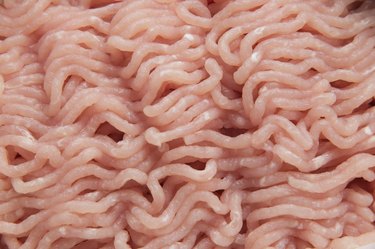 Grinding beef exposes more of its surface to contaminants. Image Credit: Dynamic Graphics Group/Dynamic Graphics Group/Getty Images
Grinding beef exposes more of its surface to contaminants. Image Credit: Dynamic Graphics Group/Dynamic Graphics Group/Getty Images
Hamburger, or ground beef, contains bacteria that are generally destroyed through proper freezing and cooking. How it is handled before being used determines whether or not it will be safe to eat, and ground beef that has been properly thawed and cooked to the correct temperature can be safely refrozen.
Here’s the Beef
According to the U. S. Department of Agriculture Food Inspection Service, raw hamburger should be the last thing you add to your shopping cart and the first thing you process for storage when you get home. Bacteria present in the meat begin to multiply rapidly above a temperature of 40 degrees Fahrenheit, making prompt refrigeration or freezing crucial to its storage life. Thaw raw ground beef safely in the refrigerator, in cold water or in the microwave — but never on the counter at room temperature, where its quality deteriorates rapidly.
Hot Stuff
Proper and thorough cooking is the only way to ensure that most harmful bacteria present in hamburger are destroyed. This means cooking raw thawed patties to an internal temperature of at least 160 degrees F and sautéing loose ground beef until it is cooked through and is uniformly brown with no pink color remaining. To prepare it for freezing, cool the cooked hamburger quickly; wrap it in several thicknesses of heavy-duty freezer wrap or aluminum foil, or place it in heavy-duty resealable bags; and store the meat in the coldest part of the freezer.
Time is of the Essence
You can refreeze cooked hamburger patties for up to four months without affecting their quality, and cooked loose ground beef for up to three months. Both patties and loose meat can be cooked straight from the freezer or thawed in the refrigerator, and should be used as soon as possible. Discard any cooked hamburger products that show signs of freezer burn or partial thawing and refreezing, as there is no way to be completely sure that they are safe.
Words to the Wise
The U.S. Department of Agriculture guidelines are geared toward preventing illness caused by several types of bacteria found routinely in hamburger. These include salmonella and escherichia coli, or E. coli, a bacteria that survives in refrigerated and frozen hamburger and causes serious illness that, in some cases, is fatal. You can never be too careful when handling raw hamburger, because bacteria never announces its entrance. Raw meat that has been thawed in the refrigerator can be safely refrozen, as can refrigerated cooked meat. However, never partially cook raw ground beef for later use, as harmful bacteria still present cannot be destroyed by further cooking.


